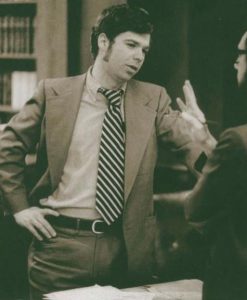
(Dec. 18, 1951-Apr. 14, 2007). Born in Indianapolis, Jim Jontz attended North Central High School and was an eagle scout. As a teenager, he served as a naturalist at Shakamak State Park, in Jacksonville, Indiana, and led nature hikes for , where his mother then worked.
Jontz began his college career at Williams College but later transferred to Indiana University (IU), Bloomington where he became a fierce environmentalist. He coordinated the Crisis Biology group, a student organization that looked to address environmental concerns on campus and in the Bloomington community. As a senior project, Jontz also cofounded the Indiana Public Interest Research Group (INPIRG). After obtaining his bachelor’s degree in geology from IU, he went on to earn a masters’ degree in history from and a law degree from Valparaiso University School of Law.
While studying at Purdue University, Jontz became active in the protest against building a dam on Big Pine Creek in northwestern Indiana. He considered it harmful to the environment and a waste of taxpayer money. Indiana state representative and Republican majority leader John “Jack” Guy supported the dam. Jontz challenged Guy for the 25th House district seat, and at 22 years old, he won by two votes. He served in the Indiana House for 10 years before being elected to the Indiana Senate from the seventh district in 1984.
In 1986, Jontz won election to the U.S. House of Representatives for Indiana’s 5th congressional district. Considered a hard-working member of Congress, he served on the House Agriculture, Education and Labor, and Veterans Affairs committees. In addition, he was a member of the Select Committee on Aging.
In the U.S. House, Jontz continued to champion environmental issues. He worked for the preservation of ancient forests in the Pacific Northwest and encouraged collaboration between organized labor organizations and environmentalists. Because of his stance on the environment, Jontz drew national attention and the support of such celebrities as actor Woody Harrelson and singer Carole King.
Jontz faced a tough reelection campaign for his House seat in 1992. He lost to Steven Buyer, a Persian Gulf War veteran, who attacked Jontz’s record in opposition to the conflict. The pharmaceutical and timber industries targeted Jontz, which also led to his defeat. Jontz ran for Congress again, this time for the U.S. Senate in 1994, but lost to Senator .
Leaving public office, Jontz served as director of the Endangered Species Coalition in Washington, D.C. He played a significant role in protecting the Endangered Species Act when it was under attack during the 1990s.
In 1995 Jontz moved to Portland, Oregon, to become executive director of the Western Ancient Forest Campaign. In Portland, he also organized the Alliance for Sustainable Jobs and the Environment. Between 1998 and 2000, he served as president of Americans for Democratic Action, a liberal political organization that advocated for progressive policies.
In the defense of ancient forests, Jontz did not shy away from participating in acts of civil disobedience. Those who work to protect forests revere him, and many hail him as one of the greatest leaders of the modern environmental movement.
Jontz died in Portland, Oregon, following a long battle with colon cancer.

Help improve this entry
Contribute information, offer corrections, suggest images.
You can also recommend new entries related to this topic.